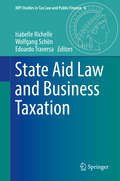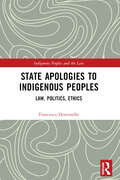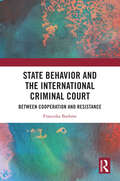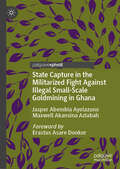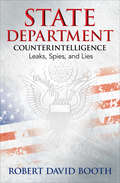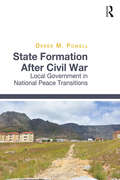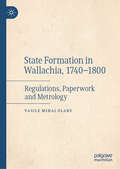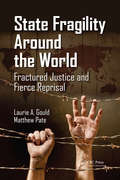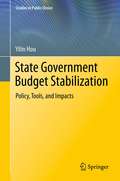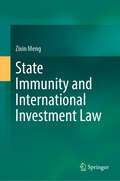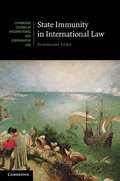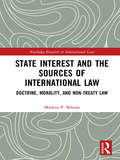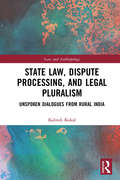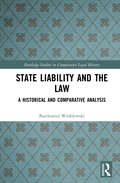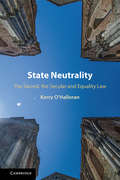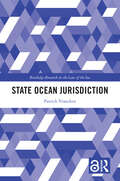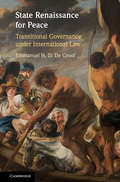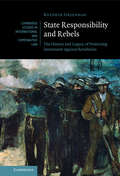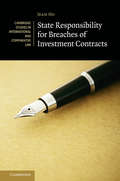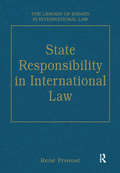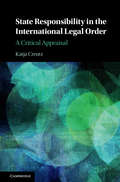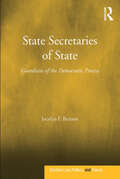- Table View
- List View
State Aid Law and Business Taxation
by Wolfgang Schön Isabelle Richelle Edoardo TraversaThis book is a compilation of contributions exploring the impact of the European Treaty provisions regarding state aid on Member States' legislation and administrative practice in the area of business taxation. Starting from a detailed analysis of the European Courts' jurisprudence on Art. 107 TFEU the authors lay out fundamental issues - e. g. on legal concepts like "advantage", "selectivity" and "discrimination" - and explore current problems - in particular policy and practice regarding "harmful" tax competition within the European Union. This includes the Member States' Code of Conduct on business taxation, the limits to anti-avoidance legislation and the options for legislation on patent boxes. The European Commission's recent findings on preferential "rulings" are discussed as well as the general relationship between international tax law, transfer pricing standards and the European prohibition on selective fiscal aids.
State Apologies to Indigenous Peoples: Law, Politics, Ethics (ISSN)
by Francesca DominelloThis book considers the ethics and politics of state apologies made to Indigenous peoples.The prevalent tendency to treat an apology as a speech act has maintained the focus on the state leader making the apology and not on the victims’ claims. This book demonstrates the inherent shortcomings of this approach through an examination of apologies delivered to Indigenous peoples in Australia and Canada. Contrasting the texts of these apologies with Indigenous peoples' responses, the book develops an understanding of apology as a relational process. This involves engaging indigenous peoples in dialogue, the aim of which would be to address past injuries by fulfilling the apology's transformative promise of 'never again' to indigenous peoples' satisfaction. The book concludes by examining more recent developments in Australia and Canada that highlight the contunuing need for government accountability to fulfil this promise and ensure indigenous people's rights and interests are upheld. This book will be of considerable interest to scholars and students in the fields of law and politics , Indigenous studies; forgiveness studies; transitional justice and reconciliation; settler colonialism and decolonisation.
State Behavior and the International Criminal Court: Between Cooperation and Resistance
by Franziska BoehmeThis book analyses patterns and causes of state cooperation with the International Criminal Court. The work focuses on several African cases, including those against leading state officials, to dive into current debates about compliance with international law and resistance to international courts. The book, which draws on interview data collected in The Hague, Kenya, and South Africa, reveals the diversity of state behaviors ranging from full compliance and diplomatic support to partial compliance to resistance and exit. This redirects the widespread narrative about African resistance against the ICC to include evidence of continued Court support. It is argued that the degree of cooperation the Court receives is affected by a government’s perceived costs and benefits of executing an ICC request: a cooperation request is considered high-cost or low-cost depending on the suspect’s position, the type of action requested, and the government’s domestic and regional policy objectives. In response, the Court has been careful not to alienate states further, thus highlighting that the Court is both above and below the state: having the power to charge individuals including state officials, but relying on governments—sometimes those from which suspects hail—to provide critical information about the same suspects. The book will be of interest to academics, researchers and policy-makers working in the areas of international law, human rights, international criminal justice, and international relations.
State Capture in the Militarized Fight Against Illegal Small-Scale Goldmining in Ghana
by Jasper Abembia Ayelazuno Maxwell Akansina AziabahThis slim book addresses one of the most vexed questions about governance and politics in natural resources-rich, albeit poor, countries across the world. Why have most states in natural resources-rich developing countries failed to regulate their artisanal and small-scale mining (ASM) industries? This failure is both intellectually and politically puzzling, because these same states demonstrate capability in different functions and regulations of other sectors of the economy. Ghana is a quintessential example of this puzzle. Despite its legendary reputation as a relatively well-governed, peaceful, and democratic country, its ASGM sector is characterized predominantly by informality, criminality, and horrendous environmental and human-development effects, which include the ferocious denuding of the country’s vegetation cover, toxic pollution of water bodies, and serious health and safety hazards inflicted on the rural populace in mining areas. This book seeks to contribute a fresh state-theoretical perspective, state capture, to unravel this puzzle. It argues that the chaotic, criminal, and ruinous Ghanaian ASGM sector – known in Ghanaian parlance as the galamsey menace – is caused by state capture. The Ghanaian state has been captured by the mining power-elites, something that allows them to undertake criminal and destructive mining with impunity. These state captors are not doing artisanal and small-scale mining (ASM), but rather capitalist mechanized mining (CMM), which ravages the environment on a large scale and with breakneck speed. State capture in Ghana’s ASGM sector is demonstrated clearly in the book through vivid description and rigorous analysis of the failed militarised fight against the galamsey menace between 2017 and 2022. This is the period the Head-of-State and Commander-in-Chief of the Ghana Armed Forces (GAF) vowed to fight and defeat the perpetrators of this crime at the risk of losing his presidency. He then declared war on the perpetrators and commandeered the coercive apparatuses of state, led by the GAF, to fight it. The book argues that the state failed spectacularly to win this war, the evidence of which is the aggravation of the deleterious environmental and human effects of galamsey. For example, the rivers and water bodies of Ghana have witnessed unprecedented levels of poisoning with lethal chemicals. The rural populace in mining communities is inflicted with serious maternal and neonatal health hazards, such as hideous congenital and physical disorders of some babies born in these communities, and sadly, the deaths of these babies. Why, despite its overwhelming coercive capacity, did the Ghanaian state fail to win a war against a weak enemy: galamsey operators, who are mostly unarmed civilians, and operating in plain sight of state agencies? Using the lens of state captured, this book addressed this question, offering fascinating and penetrating insights into the puzzle. Being the first to do this, the book contributes to advancing theory, methods, and political praxis in the study and governance of the ASM industry in Ghana. As failed military crackdowns on illegal ASM are common across natural resources-rich developing countries, the contribution this book makes may be germane to these countries in, say, Latin America and Asia.
State Control over Private Military and Security Companies in Armed Conflict
by Hannah TonkinThe past two decades have witnessed the rapid proliferation of private military and security companies (PMSCs) in armed conflicts around the world, with PMSCs participating in, for example, offensive combat, prisoner interrogation and the provision of advice and training. The extensive outsourcing of military and security activities has challenged conventional conceptions of the state as the primary holder of coercive power and raised concerns about the reduction in state control over the use of violence. Hannah Tonkin critically analyses the international obligations on three key states - the hiring state, the home state and the host state of a PMSC - and identifies the circumstances in which PMSC misconduct may give rise to state responsibility. This analysis will facilitate the assessment of state responsibility in cases of PMSC misconduct and set standards to guide states in developing their domestic laws and policies on private security.
State Department Counterintelligence: Leaks, Spies, and Lies
by Robert David BoothA veteran counterintelligence agent presents a revealing chronicle of his State Department investigations into intelligence leaks and spying on US soil. On October 7th, 1974, Robert D. Booth swore an oath to support and uphold the United States Constitution as a special agent of the State Department&’s Office of Security. As a member of the Special Investigations Branch, he investigated numerous information leaks, losses of classified documents, and instances of espionage. Now, in State Department Counterintelligence, Booth reveals some of the most egregious leaks, spies, and lies that have adversely affected national security over his decades-long career. Booth tells the story of his pivotal role in three major counterespionage assignments as well as numerous investigations into unauthorized disclosures—including the unmasking of Fidel Castro&’s most damaging US citizen spy. With the narrative style of a political thriller, Booth brings readers inside the real world of counterintelligence.
State Food Crimes
by Howard-Hassmann Rhoda E.Some states deny their own citizens one of the most fundamental human rights: the right to food. Rhoda E. Howard-Hassmann, a leading scholar of human rights, discusses state food crimes, demonstrating how governments have introduced policies that cause malnutrition or starvation among their citizens and others for whom they are responsible. The book introduces the right to food and discusses historical cases (communist famines in Ukraine, China and Cambodia, and neglect of starvation by democratic states in Ireland, Germany and Canada). It then moves to a detailed discussion of four contemporary cases: starvation in North Korea, and malnutrition in Zimbabwe, Venezuela, and the West Bank and Gaza. These cases are then used to analyse international human rights law, sanctions and food aid, and civil and political rights as they pertain to the right to food. The book concludes by considering the need for a new international treaty on the right to food.
State Formation After Civil War: Local Government in National Peace Transitions
by Derek M PowellState formation after civil war offers a new model for studying the formation of the state in a national peace transition as an integrated national phenomenon. Current models of peacebuilding and state building limit that possibility, reproducing a fragmented, selective view of this complex reality. Placing too much emphasis on state building as design they place too little on understanding state formation as unplanned historical process. The dominant focus on national institutions also ignores the role that cities and civic polities have played in constituting the modern state. Mining ideas from many disciplines and evidence from 19 peace processes, including South Africa, the book argues that the starting point for building a systematic theory is to explain a distinct pattern to state formation that can be observed in practice: Despite their conflicts people in fragile societies bargain terms for peaceful coexistence, they make attempts to constitute the right to rule as valid state authority, in circumstances prone to conflict, over which they have imperfect influence, not control. Though the kind of institutions created will differ with context, how rules for state authority are institutionalized follows a consistent basic pattern. That pattern defines state formation in peace transitions as both a unified, if contingent, field of normative practice and an object of comparative study. Where the national-centric models see local government as a matter belonging to policy on decentralization for later in the reconstruction phase, the book uncovers a distinct "local government dimension" to peace transitions: A civic dimension to national conflicts that must be explained; incipient or proto-local authorities that emerge even during civil war, in peace making, after state collapse; the fact that it is common for peace agreements and constitutions to include rules for local authority, for local elections to be held as part of broader democratization, and for laws to be enacted to establish local government as part of peace compacts. The book develops the concept of local peace transition to explain the distinctive constitutive role of this local dimension in peace-making and state formation. This path-breaking book will be of compelling interest to practitioners, scholars and students of comparative constitutional studies, international law, peace building and state building.
State Formation in Wallachia, 1740–1800: Regulations, Paperwork and Metrology
by Vasile Mihai OlaruThis book explores the transformation of the state in Wallachia, an Ottoman tributary principality, between 1740 and 1800, by focusing on three administrative techniques: regulations, paperwork (registers, identification certificates), and weights and measures. The implementation by the central power of regulations, bookkeeping, certificates, and standard units of measurement was not smooth, but it nevertheless heralded the beginning of the struggle against localism and the efforts to extend the boundaries of legitimate state action. The author challenges the (mostly Romanian) historiography of the Phanariot period, which has portrayed the state as a set of institutions undertaking certain responsibilities and has insisted almost exclusively on its extractive function and abusive character. Instead, this book takes a closer look at how the Wallachian state functioned, examining how its means of interacting with its subjects changed in the second half of the eighteenth century. Rethinking the problem of the state in eighteenth-century Wallachia, traditionally regarded as a mere instrument of Ottoman domination, it claims that it was precisely during this time that the bases of modern statehood were laid in a context defined by imperial rivalries (Ottoman, Habsburg, Russian) in the region. Making the case for state formation in the absence of preparation for war, the author also stresses, in contrast to recent contributions that decentre the state, the need to study the process whereby the effect of state coherence is produced. While focusing on Wallachia, this book provides valuable reading for those interested in early modern administrative and legal history, the history of state formation, and Southeast European history more generally.
State Fragility Around the World: Fractured Justice and Fierce Reprisal
by Laurie A. Gould Matthew PateFailed and fragile states often govern through the criminalization of otherwise inconsequential or tolerated acts. These weak states also frequently use kidnapping, murder, and other violent or oppressive tactics to maintain order and stay in power. State Fragility Around the World: Fractured Justice and Fierce Reprisal analyzes the path to state f
State Government Budget Stabilization
by Yilin HouThis book is the first comprehensive, full-scale treatment of the law, politics and economics with regard to the policies and policy instruments for budget stabilization at the state level. Covering the period from 1946 through 2008 in the United States, it provides details on the methods and results of empirical tests of the effects of budget stabilization instruments on government operations, public service provision, and some other aspects of social and economic life. With the lingering effects of the most recent financial crisis and economic downturn, and the subsequent Tea Party movement advocating smaller government and deficit reduction, this book carries timely and important theoretical as well as practical implications, particularly in regard to the potential for counter-cyclical fiscal policy in mitigating negative impacts during a recession. The first contribution of the book is in public finance theory: it provides insights into the applications of the stabilization function in the context of strong government, thereby refining Keynesianism. The second aspect is in Public Choice: the creation and functioning of budget stabilization funds offer extra evidence to demonstrate that the general public provides input and voice in more than the conventional ways when it comes to policy making, even in an area dominated by strong government. The third aspect is in policy making, exploring the opportunities for refining policy tools in preparation for future downturns.
State Immunity and International Investment Law
by Zixin MengThe book provides a sophisticated analysis of state immunity from an enforcement perspective. It covers all relevant legal techniques of enforcing an arbitral award against a sovereign state. Besides tackling the plea of state immunity through the courts, this book also covers notable non-judicial remedial measures which may aid the aggrieved investors in satisfying their claims against state parties to a dispute. These measures may be used either to enhance the effectiveness of judicial remedies or as stand-alone remedies when legal measures seem (or prove to be) ineffective. After having identified problems arising from a lack of universal agreement on state immunity and the diversity and, more dishearteningly, the inadequacy of forms of enforcement available to an aggrieved claimant, this book proposes a new approach to solve state immunity issues. The international community must work towards the setting up of a central enforcement agency, a functional model of enforcement.
State Immunity in International Law
by Xiaodong YangThe immunity or exemption enjoyed by States from legal proceedings before foreign national courts is a crucial area of international law. On the basis of an exhaustive analysis of judicial decisions, international treaties, national legislation, government statements, deliberations in international organisations as well as scholarly opinion, Xiaodong Yang traces the historical development of the relevant doctrine and practice, critically analyses the rationale for restrictive immunity and closely inspects such important exceptions to immunity as commercial transactions, contracts of employment, tortious liability, separate entities, the enforcement of judgments, waiver of immunity and the interplay between State immunity and human rights. The book draws a full picture of the law of State immunity as it currently stands and endeavours to provide useful information and guidance for practitioners, academics and students alike.
State Interest and the Sources of International Law: Doctrine, Morality, and Non-Treaty Law (Routledge Research in International Law)
by Markus P. BehamThis book addresses the disparity between positive non-treaty law and its scholarly assessment in the area of moral concepts, understood as altruistic as opposed to reciprocal legal obligations. It shows how scholars are generously willing to assert the existence of a rule of international law, thereby moving further away from actual state practice, not taking into account the factors of legal rhetoric and the core survival interests of the state in the formation of custom and general principles of law. The main argument is that such moral concepts can simply not manifest themselves as non-treaty sources of international law from a dogmatic perspective. The reason is the inherent connection between the formation of the non-treaty sources of international law and state interest that makes it difficult, if not impossible, to assess state practice or opinio juris in the case of altruistic obligations. The book further demonstrates this finding by looking at two cases in point: Human rights and humanitarian exceptions to the prohibition of force. As opposed to the majority of existing works on the subject, State Interest and the Sources of International Law takes a bigger-picture approach to a number of distinct problems in international law scholarship by looking at the building blocks of international relations on the one hand, and merging this with sources doctrine on the other. It will be of interest to researchers, academics, and students in the fields of international law, human rights, international relations, political science, legal philosophy, and legal theory.
State Law, Dispute Processing And Legal Pluralism: Unspoken Dialogues From Rural India (Law and Anthropology)
by Kalindi KokalThis book presents an ethnography of dispute processing by non-state forums and actors in rural India. As such it sheds light on a much neglected and contested topic. Arising in the context of recent legal and political debates that question the legitimacy of non-state actors engaged in dispute processing, the book explores the nature, form, and functioning of such forums and actors in two locations in rural India. Focusing on a fishermen’s community belonging to the caste of Hindu Machimār Koḷīs in coastal Maharashtra and an agrarian community in Uttarakhand with members from the Pandit, Thakur, Bhotiā, and Harijan caste groups, this study shows the manner in which non-state forums and actors engage with state law and its regulatory systems.
State Liability and the Law: A Historical and Comparative Analysis (Routledge Studies in Comparative Legal History)
by Bartłomiej WróblewskiThis book explores the historical foundations of holding public authorities accountable for their acts, and discusses how and why the idea that the state should or should not be held liable became established in three significant jurisdictions. The issue of state liability for legislative acts is considered one of the most difficult and controversial problems in jurisprudence. This book analyses the development of concepts and institutions of liability for the acts of legislator pertaining to the general principles of state liability until the mid-20th century in the leading European legal systems: Germany, France and Great Britain. It is shown that, in contrast to the prevailing conviction, the lack of liability for law-making instruments was not an unassailable dogma, and that questions as to whether such liability was possible were being asked from the Middle Ages onwards. The book will be a valuable resource for academics and researchers in the areas of Constitutional Law, Public Law, History of Law, History of Legal and Political Thought, Philosophy of Law, and Comparative Legal Studies.
State Neutrality: The Sacred, the Secular and Equality Law
by Kerry O'HalloranThe state is legally required to be neutral towards religion, but in many countries it is increasingly anything but. This book conducts a comparative legal analysis of the church–state relationship within and between western countries – including the USA, France and Israel – that are key players in international and domestic dynamics in which religion and religious conflict take centre stage. It analyses how government accommodates diversity, how policies of multiculturalism and pluralism translate into legislation, the extent to which they address matters of religion and belief and what pattern of related issues then come before the courts. Finally, it considers how civil society and democracy in general can maintain a balance between the interests of those of different religions and beliefs and those of none. In this illuminating study, Kerry O'Halloran shows how the relationship between religion and government affects civil society and the functioning of democracy in North America and Europe.
State Ocean Jurisdiction (Routledge Research on the Law of the Sea)
by Patrick Henri VranckenProposing a systematic analytical framework which assists in understanding and applying the international law regime governing State ocean jurisdiction with a view to improved ocean governance for sustainable development, this book distinguishes between, and focuses on, the form, the ground, the scope and the purpose of State ocean jurisdiction. Defining jurisdiction as the international-law authority of a State to be involved in a factual matter on the basis of a valid legal ground to perform authoritative acts impacting on that matter, it disaggregates the concept the complexity of which often leads to States failing to make full use of their existing ocean jurisdictions. In the process, it identifies when and to what extent there are gaps and overlaps of jurisdictions. Bringing clarity on an inevitably complex and often misunderstood framework that is aimed at striking a universally accepted balance of competing interests, the book lays the foundation for future research, contextualising the position of State ocean jurisdiction not only in terms of ocean governance, but in the whole of public international law. With an original systematic focus on State ocean jurisdiction, the book will be of interest to academics, students and practitioners working in the areas of international law of the sea, ocean governance, human rights and environmental law.
State Renaissance for Peace: Transitional Governance under International Law
by Emmanuel H. De GroofAfter 1989, the function of transitional governance changed. It became a process whereby transitional authorities introduce a constitutional transformation on the basis of interim laws. In spite of its domestic nature, it also became an international project and one with formidable ambitions: ending war, conflict or crisis by reconfiguring the state order. This model attracted international attention, from the UN Security Council and several regional organisations, and became a playing field of choice in international politics and diplomacy. Also without recourse to armed force, international actors could impact a state apparatus – through state renaissance. This book zooms in on the non-forcible aspects of conflict-related transitional governance while focusing on the transition itself. This study shows that, neither transitional actors nor external actors must respect specific rules when realising or contributing to state renaissance. The legal limits to indirectly provoking regime change are also being unveiled.
State Responsibility
by James CrawfordAnnexed to GA Resolution 56/83 of 2001, the International Law Commission's Articles on Responsibility for Internationally Wrongful Acts put the international law of responsibility on a sound footing. As Special Rapporteur for the second reading, James Crawford helped steer it to a successful conclusion. With this book, he provides a detailed analysis of the general law of international responsibility and the place of state responsibility in particular within that framework. It serves as a companion to The International Law Commission's Articles on State Responsibility: Introduction, Text and Commentaries (Cambridge University Press, 2002) and is essential reading for scholars and practitioners concerned with issues of international responsibility, whether they arise in interstate relations, in the context of arbitration or litigation, or in bringing international claims.
State Responsibility and Rebels: The History and Legacy of Protecting Investment Against Revolution (Cambridge Studies in International and Comparative Law #161)
by Kathryn GreenmanThis book traces the emergence and contestation of State responsibility for rebels during the nineteenth and early-twentieth centuries. In the context of decolonisation and capitalist expansion in Latin America, it argues that the mixed claims commissions-and the practices of intervention associated with them-served to insulate economic order against revolution, by taking the question of who assumed the risk of harm by rebels out of the scope of national authority. The jurisprudence of the commissions was contradictory and ambiguous. It took a lot of interpretive work by later scholars and codifiers to rationalise rules of responsibility out of these shaky foundations, as they battled for the meaning and authority of the arbitral practice. The legal debates were structured around whether the standard of protection against rebels owed to aliens was nationally or internationally determined and whether it was domestic or international authority that adjudicated such standard-a struggle over the internationalisation of protection against rebels.
State Responsibility for Breaches of Investment Contracts (Cambridge Studies in International and Comparative Law #136)
by Jean HoThere is a wealth of material that shapes the law of State responsibility for breaches of investment contracts. First impressions of an unsettled or uncertain law have thus far gone unchallenged. But unchallenged first impressions point to the need for a detailed study that investigates and analyses the sources, the content, the characteristics, and the evolution of this law. The argument at the heart of this monograph is that the law of state responsibility for breaches of investment contracts has carved a unique and distinct trajectory from the traditional route for the creation of international law, developing principally from arbitral awards, and mimicking, to a considerable extent, the general international law on the protection of aliens and alien property. This book unveils the remarkable journey of the law of state responsibility for breaches of investment contracts, from its origins, to its formation, to its arrival at the cusp of maturity.
State Responsibility in International Law (The Library of Essays in International Law)
by René ProvostIn the wake of the adoption by the International Law Commission of a complete set of articles on state responsibility in international law in 2001, this collection assembles a number of essays tracing key debates which have marked the evolution of this field over the last fifty years. These include explorations of the general theory of state responsibility (link between ’primary’ and ’secondary’ rules, the place of due diligence, the link between liability and wrongfulness), the consequences of an internationally wrongful act (nature of remedies, suitability of countermeasures, third states and the shift from bilateralism to community interests in the law of state responsibility), the debate over criminalizing state responsibility, and the continuing relevance of the law of injuries to aliens. The collection also contains a series of essays offering critical perspectives on state responsibility, including feminist and developing world perspectives. It is completed by an extensive and up-to-date bibliography.
State Responsibility in the International Legal Order: A Critical Appraisal
by Katja CreutzState responsibility in international law is considered one of the cornerstones of the field. For a long time it remained the exclusive responsibility system due to the primacy of States as subjects of international law. Its unique position has nonetheless been challenged by several developments both within and outside the international legal order, such as the rise of alternative responsibility ideas and practices, as well as globalization and its consequences. This book adopts a critical and holistic approach to the law of State responsibility and analyzes the functionality of the general rules of State responsibility in a changed international landscape characterized by the fragmentation of responsibility. It is argued that State responsibility is not equally relevant across the broad spectrum of international obligations, and that alternative constructions of responsibility, namely international criminal law and international liability, have increased in standing.
State Secretaries of State: Guardians of the Democratic Process (Election Law, Politics, And Theory Ser.)
by Jocelyn F. BensonNearly a decade after the 2000 Presidential elections invited a firestorm of questions about the sanctity of our democratic process, there continues to be a heightened interest in the role of state-wide elections officials, typically the state's Secretary of State - this book looks into their pivotal role in the promotion of a healthy democracy. Much past interest has resulted in overly critical coverage of election errors, ignoring the tireless efforts that ensure the American citizens benefit from a democratic, inclusive and accountable election process. Through a series of case studies, anecdotes, and interviews with current and recent secretaries, State Secretaries of State author Jocelyn Benson readdresses this balance by providing the first in-depth study of the Secretary's role in registering voters, enforcing voting laws and regulations, overseeing elections, and certifying results. As such, it represents a much-needed contribution to the study of US elections, both in practice and in law.
